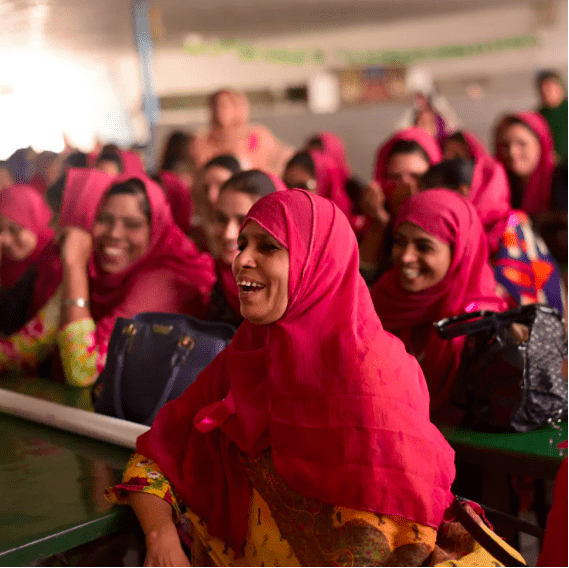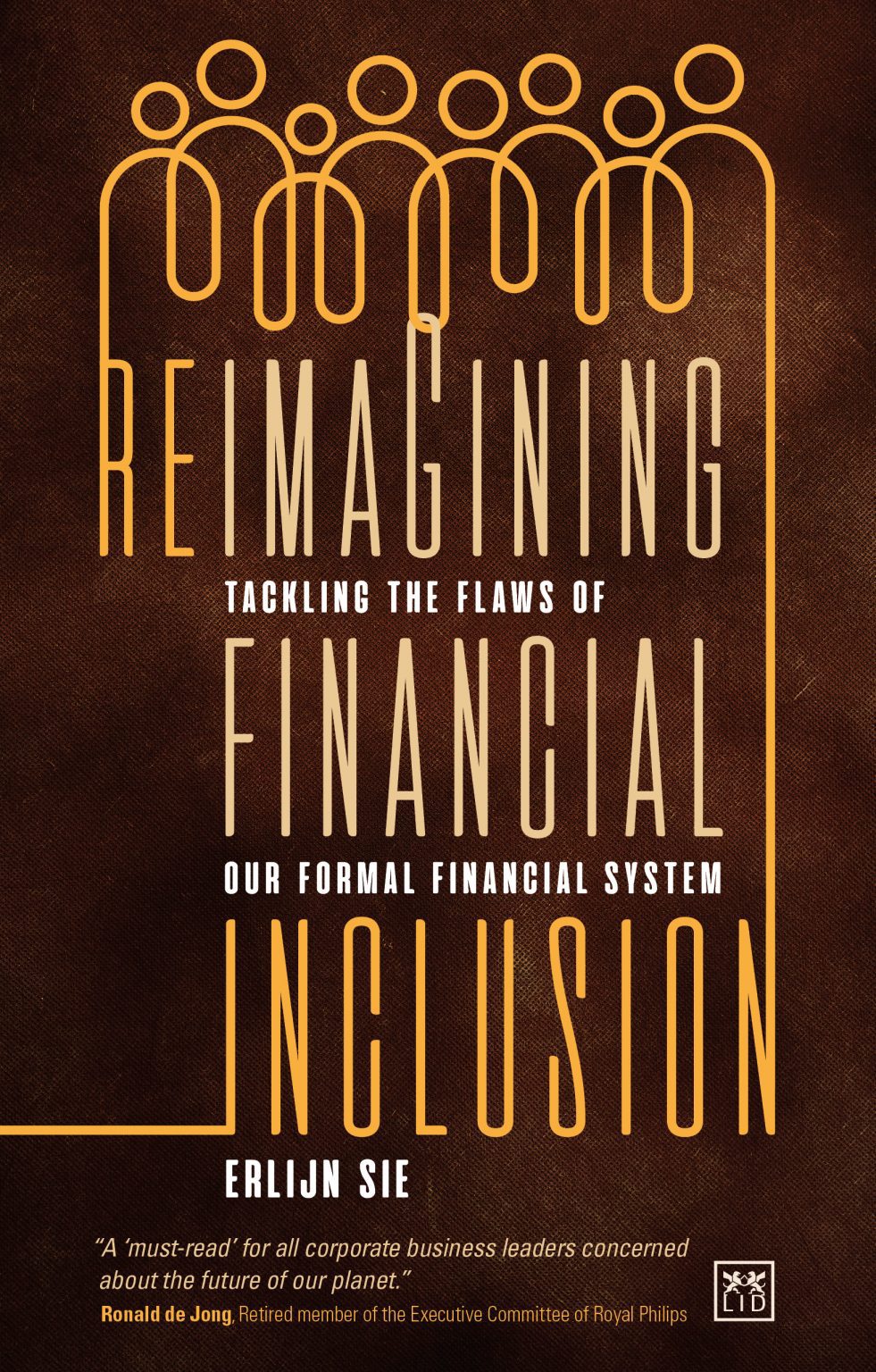|
How big business can drive financial inclusion by Erlijn Sie
By Guest Contributor Erlijn Sie
Author of Reimagining Financial Inclusion, Erlijn Sie, explains how big business can help pave the way towards financial inclusion
Financial Inclusion is not just for banks and insurers. We talked about this from the perspective of the low-income family, in article 3 “Financial Inclusion is a Long-Distance Journey“, and how we need to offer financial services that are integrated for the fulfilment of their daily needs – at the time and at the place where their needs arise. To achieve Financial Inclusion, financial service providers need to work with partners, those who live around the corner of the low-income families, those who already transact with them, in their daily lives. But, let’s also look at this from the other side of the value chain. From the perspective of the big businesses with their global supply chains, and how they depend on the hard-working hands of the low-income people. The invisible part of the global workforce, let’s face it: it’s their hands producing jeans or assembling mobile telephones in the factory, their backs are being broken in the mines to dig gold used in laptops, their fingers are weaving the cloth supplying the ateliers for home accessories, or picking fruit and nuts for food or for processing in beauty products. With a growing demand for ethically sourced and sustainable products, there’s no way to back out any more of this moral obligation to grant them opportunities to make a good living.
Let’s look at a few of the intersections, where the excluded low-income families reside in the big brands’ value chains. This is where the opportunities for big brands to contribute to Financial Inclusion are.
Unilever’s vow “in sickness & in health”

Unilever is driving inclusion up in Pakistan, with DoctHERs. DoctHERs aims to include an untapped resource: female healthcare providers. Sad but true, the majority of female health workers do not participate in the workforce. Mind you: Pakistan ranks at the bottom, 151 out of 153, on the global gender parity index (WEF 2018). We can blame systemic barriers like social norms against working women, unsafe working environments, and inflexible job offerings. Not only are women hindered to work, but the poorest families in Pakistan have limited access to healthcare. DoctHERs offers a telemedicine solution, solving both issues of financial exclusion and limited access to healthy living.
DoctHERs and Unilever joined forces to offer healthcare services in both factories -where the low-income people work-, and in rural villages where the low-income families live – facilitated by a telehealth platform. With specially trained female health workers in factories, corporate offices, ambulances, and rural health clinics, they connect patients with home-based female doctors and specialists.
Last year, they jointly impacted more than 1 million girls and women in more than 1,750 villages. In previous joint program activities, Unilever significantly improved employee retention of their field workforce as a result of this collaboration. “I believe we must leverage the reach of Unilever’s business to positively benefit the communities we work in. With this program we will be the enablers for wellbeing, health education and inclusion for rural women across Pakistan.”, according to Shazia Syed, CEO van Unilever Pakistan. The society wins, the poor people win, the female health workers win, and the company wins too. Is there any reason why you should not follow suit?
Going circular at Coca-Cola
Coca-Cola is driving inclusion in South Africa, with BanQu. BanQu aims to financially include those who are currently most excluded at the first mile of your supply chains. It is a secure blockchain platform providing complete visibility across global value chains, including the workers supplying your suppliers’ suppliers’ factories. As a company you will know who picked your crops, who mined your minerals, who collected the waste you’ve reused in your bottles of recycled plastic. BanQu and Coca-Cola are partnering in Africa, both dedicated to driving the circular economy and inclusion of the poorest families collecting the waste. Coca-cola wants to make 100% of its packaging recyclable by 2025, for which they will depend on the waste collected by people in this last-mile (or first-mile, depending on how you choose to look at it).
BanQu’s technology brings transparency to that process, but also equitability, by providing a tool for waste collectors to demonstrate their earnings, boosting their bankability and access to lower interest rate loans.
These waste collectors will bring their collected waste to buyback centres. The local buyback centres benefit from digitized transaction records and the possibility of cashless transactions, which both reduce risk and give them a better understanding of their business. This way Coca-Cola Africa can track and trace recycled material in the last-mile of their value chain, enabling them to deliver on their consumer promise. Their fresh commitment to reusing bottles, and using bottles from recycled plastic, is perhaps just-in-time to regain consumer trust, since the company struggled with reputational damage being one of the world’s largest plastic polluters.
AB-Inbev’s commitment to cassava farmers

BanQu’s blockchain platform is also providing a digitized economic history for the hard-working smallholder cassava farmers of Zambian Breweries -a subsidiary of Anheuser-Busch InBev (AB InBev). AB InBev now buys the cassava harvest from the family farmers through BanQu, creating permanent record of transactions that helps farmers build a verifiable history of their harvest. Through the platform low-income family farmers can redeem a nine-digit pin for cash or add funds to their mobile money wallets from which they pay their energy bills and school fees. Their transaction history is theirs to share, and is enabling them access to banking services, as well as new business opportunities to grow their income.
The opportunities for inclusion are endless, companies only need to decide to commit. They only need the will to contribute. Let’s face the fact that laggards in the industry might still continue to take more from the low-income workers – that has so far been kept invisible – than they give back. But the point-of-no-return lies behind us. The explicit claims made by giants in the industry are promising. Philips is being publicly explicit to include 300 million lives annually, i.e provide access to care to people who are considered to be underserved. Nestlé publicly committed to eradicating child labour in their cocoa supply chain and achieving full traceability. IKEA’s explicit commitments and actions taken are growing their inclusive and circular business. These are not just inspiring examples of their programs to reach these inclusive targets, external watch-dogs are included to ensure they’re going in the right direction. Nestlé has courageously integrated IDH – a leading foundation that works to improve the sustainability of international supply chains – for independent oversight. Philips is putting their ‘lives improved’ measure in their audited annual reports. This is no longer playing around at the sidelines. They can’t afford it. Trials such as the one against Shell and watch-dogs will be ‘the stick’, and social innovators like BanQu (and more in the book Reimagining Financial Inclusion) will be ‘the carrot’. With big brands joining the game of Financial Inclusion, acceleration is bound to happen. The only question is: will you be able to join in time before trust is broken beyond repair?
This article is part of a series, read the previous ones here:
How to Begin Reimagining Financial Inclusion
Reimagining Financial Inclusion – it’s just like biking!
Financial Inclusion is a long-distance, group journey
A Treat on Our Joint Journey – Micro-Pension Schemes for Non-Salaried Workers
ABOUT THE AUTHOR

ERLIJN SIE has 15 years of experience working with multi- nationals and an equivalent number of years leading and growing social ventures. She is the co-founder of Micro- credits for Mothers and Credits for Communities and was managing director of the Banking with the Poor Net- work and HandsOn Microfinance. Currently, she works at Ashoka – the world’s largest international network of social entrepreneurs – with blue chip companies to trans- form business into a force for good through collaboration with social innovators. Erlijn has devoted her career to contributing to a more just and inclusive economy. Erlijn holds two Masters degrees in Management Sciences and Asian Studies.
LinkedIn: https://www.linkedin.com/in/erlijn-sie-989491/
Suggested Reading

To live in today’s world, you need money; yet the majority of people do not have access to it. This book features 13 game changers from around the world who are challenging the status-quo and paving new pathways to financially include low-income families. Through an in-depth study of their thought-provoking strategies, a framework for inclusion is distilled, centring around five levers to tackle the flaws of our formal financial system. If you are curious about how to get involved with changing the future of finance, this book is for you.
